Condoms – the only form of contraception that prevents STDs.
A responsible sexually active adult should also have regular STD checks, especially when they change partners. Many STDs do not always cause symptoms, but you might pass infection on to a partner who develops serious complications, including infertility.
Perhaps you feel that you do not have sex often enough to warrant this? Don’t kid yourself! If you have sex with one person who has had sex with 20 people, you are effectively taking on that person’s risk.
While this is not an exhaustive list, it covers some of the infections most likely to cross your path, describing their symptoms and what course of action to take.
If you have had unprotected sex and develop any of the symptoms listed, you should (if possible) go immediately to a reputable health centre for an STD test.
Sexually acquired infections
If you think you have one of the infections listed below, you should never have sex without a condom.
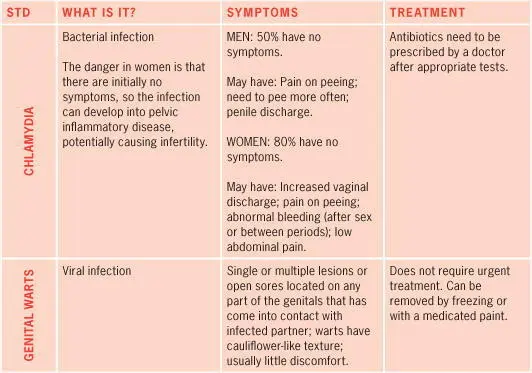
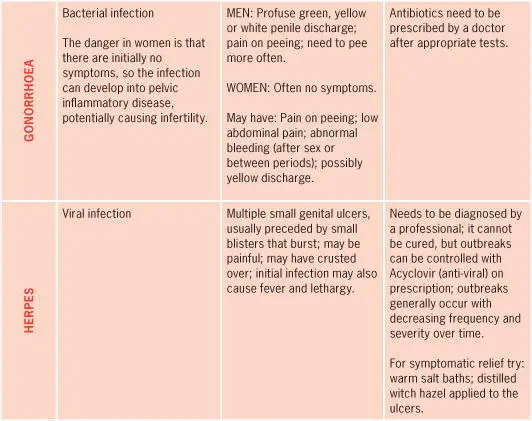
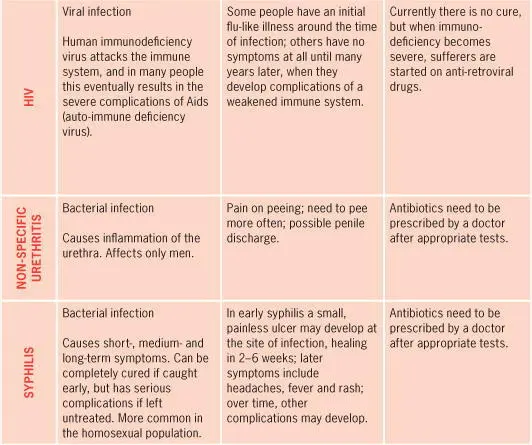
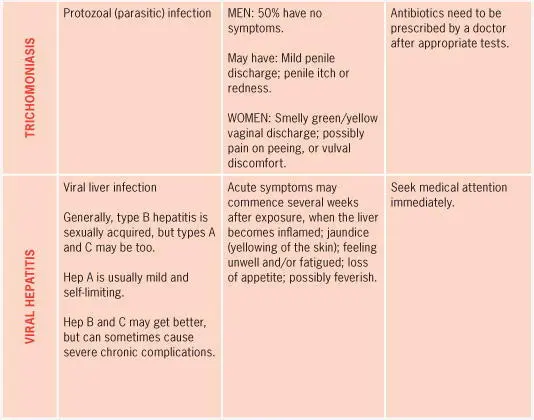
Non-sexually acquired genito-urinary conditions
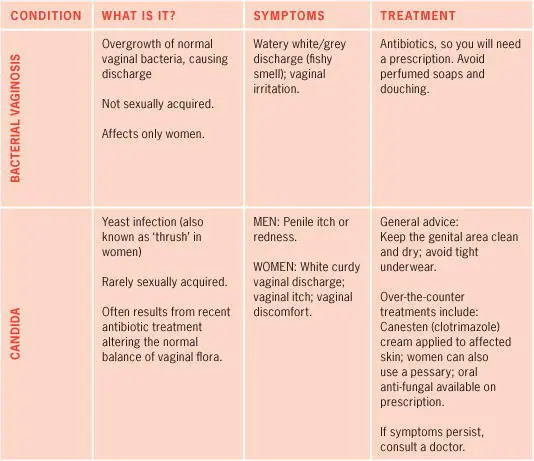
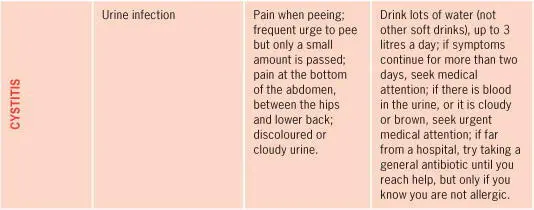
/URINARY TRACT INFECTIONS
Does it burn when you pee? Are you bursting for the loo, only to find that a pathetic trickle of liquid fire (perhaps laced with blood) is all you can produce? Are you sometimes worried that you won’t make it to the loo in time?
These are the symptoms of a urinary tract infection (UTI), such as cystitis, the bane of many women. Hot climates, lack of sufficient drinking water and dehydration make it even more likely to occur. Here are some tips on how to prevent and treat infection.
• Stock up on over-the-counter cystitis remedies before you go abroad. You can even ask your GP to give you an advance prescription of appropriate antibiotics.
• Keep well hydrated, especially in hot climates.
• Always pee after sex. Normal urine is sterile and will wash away bacteria that have managed to work their way up the urethra during sex. This really works.
• If you feel a UTI coming on, start drinking even more water, or cranberry juice if it is to hand. Take a sachet of cystitis relief if you have one.
If you haven’t stocked up on antibiotics in advance but think you need them, it’s best to consult a doctor. If that’s not possible, you might be able to buy them without prescription from street pharmacies. Try to get local advice on which ones are reputable. Antibiotics useful for UTI include:
• Cefalexin – 500 mg twice daily for three days
• Amoxicillin – 500 mg three times a day for three days
• Co-amoxiclav (Augmentin) – 250 mg three times a day for three days
Warning:Do not take these antibiotics if you are allergic to penicillin. Ask a doctor back home what you can and can’t take if you are allergic, and ask him to provide some for you. Always read the label and always take the full course of the drug.
If you develop fever, abdominal pain or back pain, or feel unwell, you should seek medical attention immediately as you may be developing a kidney infection.
The contraception you use at home might not be the best for your trip. Asking yourself the following questions before you leave might stave off difficulties or disasters down the line.
Are you planning to have sex on your travels?
If so, take a supply of condoms. This is the only form of contraception that can protect you from sexually transmitted infections.
Are you on the pill?
If so, consider switching to a longer-term form of contraception (see chart opposite).
Do you use contraception for medical reasons (e.g. regulating periods or skin conditions)?
In this case, you probably need to stay with the pill, but check that you have enough to last your trip.
Will your GP prescribe enough pills to last the trip?
If not, you need to find out if you can obtain more pills at your destination. If your brand is not available, find out in advance what the equivalents are in other countries.
/WHICH CONTRACEPTIVE METHOD IS BEST FOR YOU?
If using any method other than condoms, you will need to consult a doctor before you start a new one.
For more detailed advice on contraceptive options, please visit the website www.patient.co.uk
The pill works by preventing ovulation. Taking a pill on seven consecutive days is sufficient to prevent ovulation. In addition, omitting more than seven days of the pill (i.e. lengthening the ‘withdrawal bleed’) allows ovulation to occur.
It is important to note that the ‘withdrawal bleed’ you get with the pill is not a true period. It occurs because of the hormone-free seven days between packets. Some pill brands require the user to stop taking a pill for a week. Other brands include a week of dummy pills so that the routine of pill-taking is not interrupted.
Types of contraception
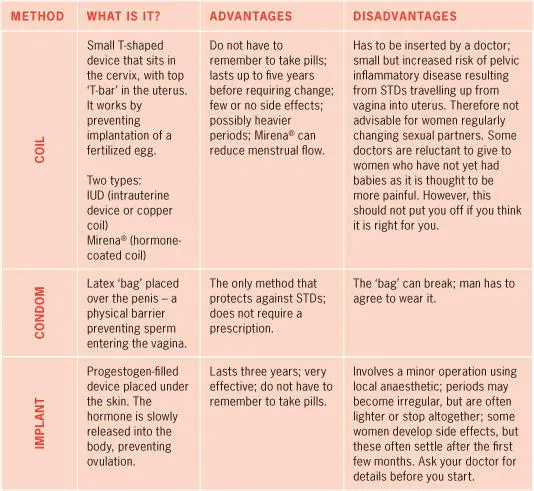
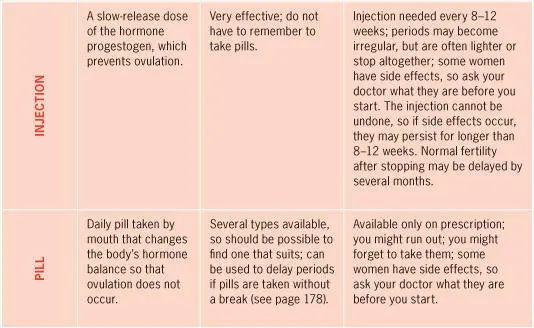
Why have a hormone-free period at all? There are two reasons:
• To reduce a woman’s exposure to the hormones which, over a long period of time, are known to increase the risk of deep-vein thrombosis and certain cancers.
• To mimic the natural menstrual cycle.
It is a common misconception that missed pills towards the end of the packet do not matter as a ‘period’ will soon follow. In fact, the opposite is the case: during the bleed, hormone levels are at their lowest and ovulation is more likely. If unprotected sex has occurred in that time, pregnancy might result.
Missing a pill
If you forget to take a pill, what you should do depends on the type of pill you are taking. Ideally, you should find out in advance by reading the leaflet that comes with the pills.
Ovulation and pregnancy may occur if you miss pills, especially if the omission occurs at the beginning or end of the packet. In order to prevent pregnancy, you should use condoms for a week after the missed pill.
Running out of pills
If you run out of pills in a foreign country, one option is to switch to condoms. However, you may be able to buy an equivalent to your current pill (i.e. one containing similar hormone levels) but with a different international trade name. A useful website on which to look this up is the IPPF Directory of Hormonal Contraceptives ( http://contraceptive.ippf.org).
Kathleen McCaul came out to Iraq with me from Oxford University to work at the Baghdad Bulletin . We were both as wide-eyed and naive as each other. She had an amazing ability to use that innocence to win her one exclusive interview after another. That access to the top corridors of power also made her vulnerable. At meetings that were supposed to be professional interviews sex-starved politicians, lawyers and soldiers, buoyed by the excitement of talking to their first girl in months and armed with an illicit bottle of booze, thought she was ripe for the picking. She had to learn how to bat them off with her eyelids:
Читать дальше
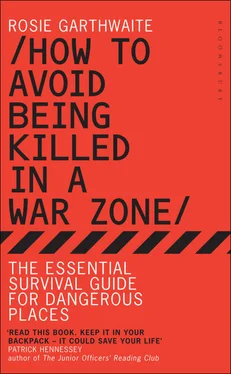











![Джонатан Димблби - Barbarossa - How Hitler Lost the War [calibre]](/books/385421/dzhonatan-dimblbi-barbarossa-how-hitler-lost-the-w-thumb.webp)







